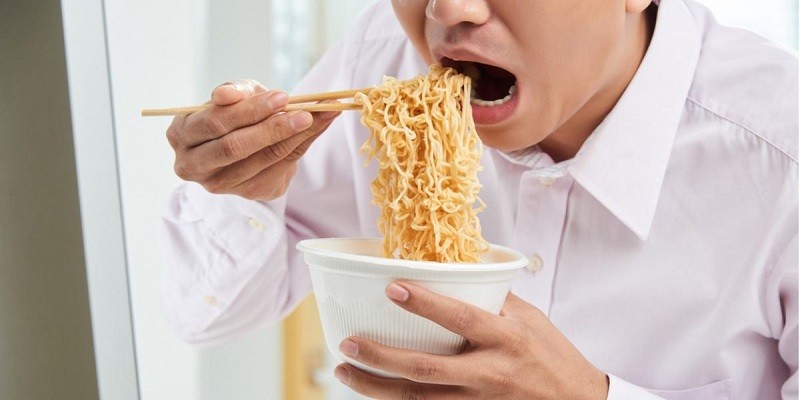Last Updated on May 30, 2024
Yes, you can eat cup noodles while pregnant, but it should be done in moderation. Instant noodles are high in sodium, and preservatives, and lack essential nutrients. Consuming them occasionally is generally safe, but it’s important to balance your diet with more nutritious foods and consult your healthcare provider for personalized advice.
Pregnancy often brings about unique cravings, and for many, cup noodles are a convenient and tasty option. However, it’s crucial to understand the nutritional implications and potential risks associated with consuming instant noodles during pregnancy. This article explores whether it’s safe to eat cup noodles while pregnant and offers tips for making healthier choices.
What is a Cup Of Noodles?
Cup noodles, also known as instant noodles, are a type of pre-cooked noodle sold in a cup or bowl. They are typically made from wheat flour, palm oil, and salt, and come with a flavoring packet that contains various seasonings, MSG, and preservatives. These noodles are popular for their convenience and quick preparation, requiring only hot water to cook.
Nutritional Value of Cup Of Noodles
| Nutritional Value | Details |
|---|---|
| Calories | 320 kcal per serving (73g) |
| Carbohydrates | 45g |
| Protein | 8g |
| Fat | 12g |
| Sodium | 986 mg |
| Fiber | 2g |
| Vitamins | Minimal amounts of B vitamins, calcium |
Risks of Eating Cups of Noodles During Pregnancy
| Risks | Details |
|---|---|
| High Sodium | Can lead to hypertension and fluid retention |
| Preservatives | Contains MSG and TBHQ, which may cause digestive issues |
| Low Nutritional Value | Lacks essential nutrients like protein, vitamins, and minerals |
| Weight Gain | High in calories and fat, contributing to excessive weight gain |
Safe Ways to Eat Cup Of Noodles During Pregnancy
To safely enjoy cup noodles during pregnancy, consider the following tips:
- Limit Consumption: Eat cup noodles occasionally rather than regularly.
- Reduce Sodium: Use only half of the seasoning packet to lower sodium intake.
- Add Nutrients: Enhance the dish by adding vegetables, lean proteins, and eggs.
- Cook Thoroughly: Ensure the noodles are fully cooked to avoid any potential bacteria.
Alternatives to Cup Of Noodles During Pregnancy
| Alternatives | Precautions |
|---|---|
| Whole Grain Noodles | Ensure they are cooked thoroughly |
| Rice Noodles | Check for low sodium options |
| Homemade Noodles | Use fresh ingredients and minimal additives |
| Vegetable Noodles | Spiralized vegetables like zucchini or carrots |
Experts Tips
- Moderation is Key: “Occasional consumption of instant noodles is fine, but they should not be a staple in your diet” (Dr. Deepti Gupta, BabyCenter).
- Enhance Nutritional Value: “Add fresh vegetables and lean proteins to your noodles to make them more nutritious” (Nona Woman).
- Monitor Sodium Intake: “High sodium can lead to complications like hypertension; use less seasoning” (MomJunction).
FAQs
Can I eat instant noodles every day during pregnancy?
No, it’s not advisable to eat instant noodles daily due to their high sodium and low nutritional content. Occasional consumption is safer.
Are there healthier instant noodle options?
Yes, opt for whole grain or rice noodles, and enhance them with fresh vegetables and lean proteins to improve their nutritional value.
Can instant noodles cause gestational diabetes?
Excessive consumption of high-carb foods like instant noodles can increase the risk of gestational diabetes. Moderation and a balanced diet are crucial.
Is MSG in instant noodles harmful during pregnancy?
While occasional consumption of MSG is generally considered safe, excessive intake can cause digestive issues and should be avoided.
How can I reduce the sodium content in instant noodles?
Use only half or less of the seasoning packet, and add your own herbs and spices to flavor the noodles.
Conclusion
While cup noodles can be a convenient and tasty option during pregnancy, they should be consumed in moderation due to their high sodium content and low nutritional value. Enhancing them with fresh vegetables and lean proteins can make them a healthier choice. Always consult with your healthcare provider for personalized dietary advice during pregnancy.







